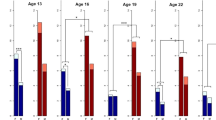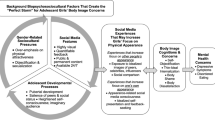Abstract
Objectives
Pressure to lose weight can increase the risk of developing disordered eating behaviours, negative body image and depressive symptomatology. Eating intuitively may counteract these negative outcomes. This research examined the unique relationship between intuitive eating and disordered eating on body mass index (BMI), body image and depressive symptoms for women of young children.
Methods
A survey of women with a child aged between six and 48 months, included the Intuitive Eating Scale, Eating Attitudes Test-26, Body Shape Questionnaire and Edinburgh Postnatal Depression Scale. Multivariate analysis of variance (MANOVA) was conducted as an omnibus test to estimate the effect of intuitive and disordered eating on BMI, negative body image and depressive symptoms.
Results
Of the 419 sample (M age = 32.06), 32% were classified with disordered and 32% with intuitive eating. MANOVA and regression analysis found disordered eating positively associated with depressive symptoms, (β = 0.303) and negative body image (β = 0.318). Intuitive eating was associated with lower depressive symptoms (β = − 0.183) and negative body image (β = − 0.615). Disordered eating (β = − 0.194) and intuitive eating (β = − 0.586) both contributed to lower BMI, with the association stronger for intuitive eating.
Conclusion
The early parenting period involves a high risk for developing disordered eating behaviours. Eating patterns are modifiable factors, illustrating the potential for positive and preventive health outcomes through adopting intuitive eating behaviours. There is an opportunity for healthcare professionals to promote physical and psychological health including for women in the early parenting period.

Similar content being viewed by others
References
Bannatyne, A. J., McNeil, E., Stapleton, P., MacKenzie-Shalders, K., & Watt, B. (2019). Disordered eating measures validated in pregnancy samples: A systematic review. Eating Disorders, 29(4), 421–446. https://doi.org/10.1080/10640266.2019.1663478
Baskin, R., & Galligan, R. (2019). Disordered eating and the perinatal period: A systematic review and best evidence synthesis of mental health and psychosocial correlates. European Eating Disorders Review, 27(5), 462–480. https://doi.org/10.1002/erv.2675
Bergmeier, H., Hill, B., Haycraft, E., Blewitt, C., Lim, S., Meyer, C., & Skouteris, H. (2020). Maternal body dissatisfaction in pregnancy, postpartum and early parenting: An overlooked factor implicated in maternal and childhood obesity risk. Appetite, 147, 1–12. https://doi.org/10.1016/j.appet.2019.104525
Cheng, Z. H., Perko, V. L., Fuller-Marashi, L., Gau, J. M., & Stice, E. (2019). Ethnic differences in eating disorder prevalence, risk factors, and predictive effects of risk factors among young women. Eating Behaviors, 32, 23–30. https://doi.org/10.1016/j.eatbeh.2018.11.004
Cox, J. L., Holden, J. M., & Sagovsky, R. (1987). Detection of postnatal depression. Development of the 10-item Edinburgh postnatal depression scale. The British Journal of Psychiatry, 150(6), 782–786. https://doi.org/10.1192/bjp.150.6.782
Easter, A., Solmi, F., Bye, A., Taborelli, E., Corfield, F., Schmidt, U., et al. (2015). Antenatal and postnatal psychopathology among women with current and past eating disorders: Longitudinal patterns. European Eating Disorders Review, 23(1), 19–27. https://doi.org/10.1002/erv.2328
Evans, C., & Dolan, B. (1993). Body shape questionnaire: Derivation of shortened “alternate forms.” International Journal of Eating Disorders, 13(3), 315–321. https://doi.org/10.1002/1098-108X(199304)13:3%3c315::AID-EAT2260130310%3e3.0.CO;2-3
Galmiche, M., Déchelotte, P., Lambert, G., & Tavolacci, M. P. (2019). Prevalence of eating disorders over the 2000–2018 period: A systematic literature review. The American Journal of Clinical Nutrition, 109(5), 1402–1413. https://doi.org/10.1093/ajcn/nqy342
Garner, D. M., Olmsted, M. P., Bohr, Y., & Garfinkel, P. E. (1982). The Eating Attitudes Test: Psychometric features and clinical correlates. Psychological Medicine, 12(4), 871–878. https://doi.org/10.1017/S0033291700049163
Gjerdingen, D., Fontaine, P., Crow, S., McGovern, P., Center, B., & Miner, M. (2009). Predictors of mothers’ postpartum body dissatisfaction. Women’s Health, 49(6), 491–504. https://doi.org/10.1080/03630240903423998
Hartley, E., Hill, B., McPhie, S., & Skouteris, H. (2018). The associations between depressive and anxiety symptoms, body image, and weight in the first year postpartum: A rapid systematic review. Journal of Reproductive and Infant Psychology, 36(1), 81–101. https://doi.org/10.1080/02646838.2017.1396301
Hawks, S., Madanat, H., Hawks, J., & Harris, A. (2005). The relationship between intuitive eating and health indicators among college women. American Journal of Health Education, 36(6), 331–336. https://doi.org/10.1080/19325037.2005.10608206
Humphreys, K. L., King, L. S., Choi, P., & Gotlib, I. H. (2018). Maternal depressive symptoms, self-focus, and caregiving behavior. Journal of Affective Disorders, 238, 465–471. https://doi.org/10.1016/j.jad.2018.05.072
Khan, R., Waqas, A., Bilal, A., Mustehsan, Z. H., Omar, J., & Rahman, A. (2020). Association of maternal depression with diet: A systematic review. Asian Journal of Psychiatry, 52, 102098. https://doi.org/10.1016/j.ajp.2020.102098
Khasteganan, N., Lycett, D., Furze, G., & Turner, A. P. (2019). Health, not weight loss, focused programmes versus conventional weight loss programmes for cardiovascular risk factors: A systematic review and meta-analysis. Systematic Reviews, 8(200), 1–18. https://doi.org/10.1186/s13643-019-1083-8
Knoph, C., Von Holle, A., Zerwas, S., Torgersen, L., Tambs, K., Stoltenberg, C., et al. (2013). Course and predictors of maternal eating disorders in the postpartum period. International Journal of Eating Disorders, 46(4), 355–368. https://doi.org/10.1002/eat.22088
Leahy, K., Berlin, K. S., Banks, G. G., & Bachman, J. (2017). The relationship between intuitive eating and postpartum weight loss. Maternal and Child Health Journal, 21(8), 1–7. https://doi.org/10.1007/s10995-017-2281-4
Ledoux, T., Daundasekara, S. S., Beasley, A., Robinson, J., & Sampson, M. (2021). The association between pre-conception intuitive eating and gestational weight gain. Eating and Weight Disorders—Studies on Anorexia, Bulimia and Obesity, 26(2), 467–474. https://doi.org/10.1007/s40519-020-00878-8
Lee, M. F., Williams, S. L., & Burke, K. J. (2020). Striving for the thin ideal post-pregnancy: Cross-sectional study of intuitive eating in postpartum women. Journal of Reproductive and Infant Psychology, 38(2), 127–138. https://doi.org/10.1080/02646838.2019.1607968
Lewis, B. A., Billing, L., Schuver, K., Gjerdingen, D., Avery, M., & Marcus, B. H. (2017). The relationship between employment status and depression symptomatology among women at risk for postpartum depression. Women’s Health, 13(1), 3–9. https://doi.org/10.1177/1745505717708475
Lim, S., Hill, B., Pirotta, S., O’Reilly, S., & Moran, L. (2020). What are the most effective behavioural strategies in changing postpartum women’s physical activity and healthy eating behaviours? A systematic review and meta-analysis. Journal of Clinical Medicine, 9(1), 237. https://doi.org/10.3390/jcm9010237
Linardon, J., & Mitchell, S. (2017). Rigid dietary control, flexible dietary control, and intuitive eating: Evidence for their differential relationship to disordered eating and body image concerns. Eating Behaviors, 26, 16–22. https://doi.org/10.1016/j.eatbeh.2017.01.008
Martínez-Olcina, M., Rubio-Arias, J. A., Reche-García, C., Leyva-Vela, B., Hernández-García, M., Hernández-Morante, J. J., & Martínez-Rodríguez, A. (2020). Eating disorders in pregnant and breastfeeding women: A systematic review. Medicina, 56(7), 352. https://doi.org/10.3390/medicina56070352
Martini, M. G., Barona-Martinez, M., & Micali, N. (2020). Eating disorders mothers and their children: A systematic review of the literature. Archives of Women’s Mental Health. https://doi.org/10.1007/s00737-020-01019-x
Opie, R. S., Uldrich, A. C., & Ball, K. (2020). Maternal postpartum diet and postpartum depression: A systematic review. Maternal and Child Health Journal, 24, 966–978. https://doi.org/10.1007/s10995-020-02949-9
Pettersson, C., Zandian, M., & Clinton, D. (2016). Eating disorder symptoms pre- and postpartum. Archives of Women’s Mental Health, 19(4), 675–680. https://doi.org/10.1007/s00737-016-0619-3
Reba-Harrelson, L., Von Holle, A., Hamer, R. M., Swann, R., Reyes, M. L., & Bulik, C. M. (2009). Patterns and prevalence of disordered eating and weight control behaviors in women ages 25–45. Eating and Weight Disorders—Studies on Anorexia, Bulimia and Obesity, 14(4), 190–198. https://doi.org/10.1007/BF03325116
Rodgers, R. F., O’Flynn, J. L., Bourdeau, A., & Zimmerman, E. (2018). A biopsychosocial model of body image, disordered eating, and breastfeeding among postpartum women. Appetite, 126, 163–168. https://doi.org/10.1016/j.appet.2018.04.007
Shloim, N., Hetherington, M. M., Rudolf, M., & Feltbower, R. G. (2015). Relationship between body mass index and women’s body image, self-esteem and eating behaviours in pregnancy: A cross-cultural study. Journal of Health Psychology, 20(4), 413–426. https://doi.org/10.1177/1359105313502568
Silveira, M., Ertel, K., Dole, N., & Chasan-Taber, L. (2015). The role of body image in prenatal and postpartum depression: A critical review of the literature. Archive of Womens Mental Health, 18(3), 409–421. https://doi.org/10.1007/s00737-015-0525-0
Smolak, L., Striegel-Moore, R. H., & Levine, M. P. (2013). The developmental psychopathology of eating disorders: Implications for research, prevention, and treatment. Routledge.
Thorpe, K. (1993). A study of the use of the Edinburgh postnatal depression scale with parent groups outside the postpartum period. Journal of Reproductive and Infant Psychology, 11(2), 119–125. https://doi.org/10.1080/02646839308403204
Tokatly Latzer, I., Rachmiel, M., Zuckerman Levin, N., Mazor-Aronovitch, K., Landau, Z., Ben-David, R. F., et al. (2018). Increased prevalence of disordered eating in the dual diagnosis of type 1 diabetes mellitus and celiac disease. Pediatric Diabetes, 19(4), 749–755. https://doi.org/10.1111/pedi.12653
Toni, G., Berioli, M. G., Cerquiglini, L., Ceccarini, G., Grohmann, U., Principi, N., & Esposito, S. (2017). Eating disorders and disordered eating symptoms in adolescents with type 1 diabetes. Nutrients, 9(8), 906–916. https://doi.org/10.3390/nu9080906
Tylka, T. L., Calogero, R. M., & Daníelsdóttir, S. (2019). Intuitive eating is connected to self-reported weight stability in community women and men. Eating Disorders, 28(3), 256–264. https://doi.org/10.1080/10640266.2019.1580126
Tylka, T. L., Lumeng, J. C., & Eneli, I. U. (2015). Maternal intuitive eating as a moderator of the association between concern about child weight and restrictive child feeding. Appetite, 95, 158–165. https://doi.org/10.1016/j.appet.2015.06.023
Tylka, T. L., & Wilcox, J. A. (2006). Are intuitive eating and eating disorder symptomatology opposite poles of the same construct? Journal of Counseling Psychology, 53(4), 474–485. https://doi.org/10.1037/0022-0167.53.4.474
Ventura, A. K., & Teitelbaum, S. (2017). Maternal distraction during breast and bottle feeding among WIC and non-WIC mothers. Journal of Nutrition Education and Behavior, 49(7), 169–176. https://doi.org/10.1016/j.jneb.2017.04.004
von Elm, E., Altman, D. G., Egger, M., Pocock, S. J., Gøtzsche, P. C., & Vandenbroucke, J. P. (2007). The strengthening the reporting of observational studies in epidemiology (STROBE) statement: Guidelines for reporting observational studies. Journal of Clinical Epidemiology, 61(4), 344–349. https://doi.org/10.1016/j.jclinepi.2007.11.008
Williams, B. M., Christopher, K., & Sinski, J. (2017). “Who doesn’t want to be this hot mom?”: Celebrity mom profiles and mothers’ accounts of their postpartum bodies. SAGE Open, 7(3), 1–12. https://doi.org/10.1177/2158244017720562
Wilson, R. E., Marshall, R. D., Murakami, J. M., & Latner, J. D. (2020). Brief non-dieting intervention increases intuitive eating and reduces dieting intention, body image dissatisfaction, and anti-fat attitudes: A randomized controlled trial. Appetite, 148, 1–8. https://doi.org/10.1016/j.appet.2019.104556
World Health Organization. (2000). Obesity: Preventing and managing the global epidemic. World Health Organization.
World Health Organization. (2009). World health statistics 2009. World Health Organization. https://apps.who.int/iris/handle/10665/44078
World Health Organization. (2017). Depression and other common mental disorders: Global health estimates. World Health Organization.
Funding
This research did not receive any specific grant from funding agencies in the public, commercial, or not-for-profit sectors.
Author information
Authors and Affiliations
Contributions
ML, SW and KB constructed the research questions and wrote the first draft of the methods. ML collected the data. MB analysed the data & wrote the first draft of the data analysis. ML and MB wrote the first draft of the results. ML and JM wrote the first draft of the introduction and conclusion. SW & KB wrote the first draft of the discussion. All authors reviewed and approved the final draft.
Corresponding author
Ethics declarations
Conflict of interest
The authors declare that there is no conflict of interest.
Additional information
Publisher's Note
Springer Nature remains neutral with regard to jurisdictional claims in published maps and institutional affiliations.
Rights and permissions
About this article
Cite this article
Lee, M.F., Madsen, J., Williams, S.L. et al. Differential Effects of Intuitive and Disordered Eating on Physical and Psychological Outcomes for Women with Young Children. Matern Child Health J 26, 407–414 (2022). https://doi.org/10.1007/s10995-021-03251-y
Accepted:
Published:
Issue Date:
DOI: https://doi.org/10.1007/s10995-021-03251-y




